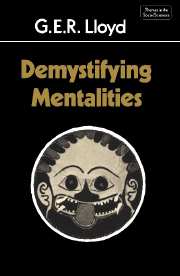Book contents
- Frontmatter
- Contents
- Note on texts and references
- Acknowledgements
- Introduction
- 1 Mentalities, metaphors and the foundations of science
- 2 Magic and science, ancient and modern
- 3 The conception and practice of proof
- 4 A test case: China and Greece, comparisons and contrasts
- Conclusion: mentalities demystified
- Notes
- Bibliography
- Index
Introduction
Published online by Cambridge University Press: 07 January 2010
- Frontmatter
- Contents
- Note on texts and references
- Acknowledgements
- Introduction
- 1 Mentalities, metaphors and the foundations of science
- 2 Magic and science, ancient and modern
- 3 The conception and practice of proof
- 4 A test case: China and Greece, comparisons and contrasts
- Conclusion: mentalities demystified
- Notes
- Bibliography
- Index
Summary
The general problem that this book addresses concerns the validity and usefulness of the notion of mentalities. This has often been used to characterise what is held to be distinctive about the thought processes or sets of beliefs of groups or of whole societies, in general or at particular periods of time, and again in describing the changes or transformations that such processes or sets of beliefs are considered to have undergone. In what circumstances, if any, is it helpful or at least legitimate to invoke the notion of a distinct mentality? How, without some such notion, can major differences not just in the content of specific ideas and beliefs, but between whole networks of them, be described and understood? Yet while the partisans of mentalities, influenced by a variety of arguments, hold that some such notion is indispensable, others have questioned its appropriateness or applicability or condemned its apparent extravagance. How the explananda themselves are to be described is as much in dispute as the explanations on offer.
The French sociologist Lucien Lévy-Bruhl secured a wide diffusion for the notion of mentalities, in particular in connection with his ill-starred hypothesis of a prelogical mentality. This was supposed to be a feature of much primitive thought and one that helped to establish a contrast between it and the logical or scientific mentality to be found in advanced civilisations and especially in his own society.
- Type
- Chapter
- Information
- Demystifying Mentalities , pp. 1 - 13Publisher: Cambridge University PressPrint publication year: 1990
- 2
- Cited by

